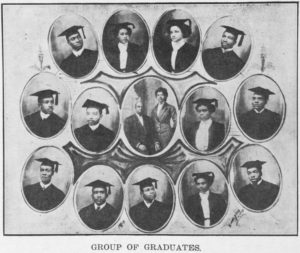Feature Blog Post by Progam Director, Anna Ojascatro Guzon
Farewell the tranquil mind! Farewell content!
Farewell the plumed troop, and the big wars,
That make ambition virtue! O, farewell!
Farewell the neighing steed, and the shrill trump,
The spirit-stirring drum, the ear-piercing fife,
The royal banner, and all quality,
Pride, pomp and circumstance of glorious war!
– Othello Act 3, scene 3 by William Shakespeare
The last session of the school year almost had the energy of physics, the kind that’s measurable. There was no vagueness about it and one didn’t have to repeat a mantra to access it. Three students would be graduating from high school. One student, who is already in college, found a job and would be moving out of transitional housing soon. It was that energy of progressing toward one’s potential, in spite of a natural tendency to keep things as they are.
The residents were chatting and laughing with the giddiness found at the end of the school year, when the weight of schoolwork lets up. And to add to the festivity of the occasion, we brought food. Considerable thought went into deciding what to serve the group of male teenagers. Crackers and cheese, like at a poetry reading? Cake? Fancy catered dishes? No, it should be something from someone’s kitchen table. Cookies and milk, with strawberries because it’s strawberry season. Milk because they are still growing.

Schomburg Center for Research in Black Culture, Manuscripts, Archives and Rare Books Division, The New York Public Library. “Group of graduates.” The New York Public Library Digital Collections. 1910. http://digitalcollections.nypl.org/items/510d47dd-e88a-a3d9-e040-e00a18064a99
One young man was more talkative than usual, gobbling cookies and strawberries as he spoke about the day he had been visualizing for months. When I first met J, last January, he told me that he’d be graduating from high school soon. He also said he didn’t like to write, yet he composed a moving block-out poem during that first workshop. At our last session, he told us that he’d be graduating in a few days and he was chosen to read a poem aloud at the ceremony. He said that his mother would attend his graduation but he didn’t know if his father was going to show up. He also said he wasn’t sure if he even wanted his father to attend his graduation.
For the workshop, we compiled the readings from the semester, and they were asked to write a cento, a poem in which each line comes from a different poem. First we asked each student and tutor to copy one line from the compilation onto a separate piece of paper. We then collected the separate lines and assembled them on the dry-erase board. Next, the students wrote their own centos, working until their limited time was up.
When it was time to go, the staff person from Marygrove asked the boys to close up their computers and clean up their work space. I saw that most of the students were still writing so I said, “No, no, they can take their time. It’s ok.” Most of the students stayed seated although dinner would be served soon.
“I’m sorry guys. It’s time for us to go,” I said after several minutes.
“Take me with you!” said J, jokingly.
“Naw, you’re going to be graduating, remember. You’re going to start that new job!”
“Yeah,” he said, his heart moving in two directions.
Last week, a recent Harvard graduate’s speech went viral. He recited a spoken-word poem that resonated with millions. Alluding to literature and song lyrics, quoting great educators such as Horace Mann and his own seventh grade teacher, virtually every line of Lift-Off by Michael Donovan is worthy of standing alone as a source of inspiration. If you haven’t already seen it on your Facebook feed, you can watch it here.
“For some, the only difference between a classroom and a plantation is time.”
Of the many uplifting lines from Donovan’s speech, this line struck me, as does any piece that highlights circumstance. Almost two decades ago, as a medical student, I took care of a patient in the emergency room of Truman Medical Center in Kansas City. She was a young woman, like myself, and she was of similar height and weight. But she was homeless, pregnant, addicted to crack, and laying on the gurney in a pine green, down coat that was covered in a layer of dirt. I sat two feet from her in a white lab coat, which was loaded with pens and folded pieces of paper. I read her birth date in the chart: 02/16/1976, the same date on which I was born. I couldn’t help wondering where I might be if I were born into her circumstances.
I never saw that patient again, after that evening. A year and a half after the encounter, I received my hood, a statement of completing an academic degree. Mine was forest green velvet, worn by those who completed a doctorate in medicine. The weighty material was laid on my shoulders by my father who is also a physician. We processed to a brass band playing, Pomp and Circumstance, recited the Hippocratic Oath, and celebrated, our hearts full of nothing but pride and relief.
– Dr. Anna Guzon


